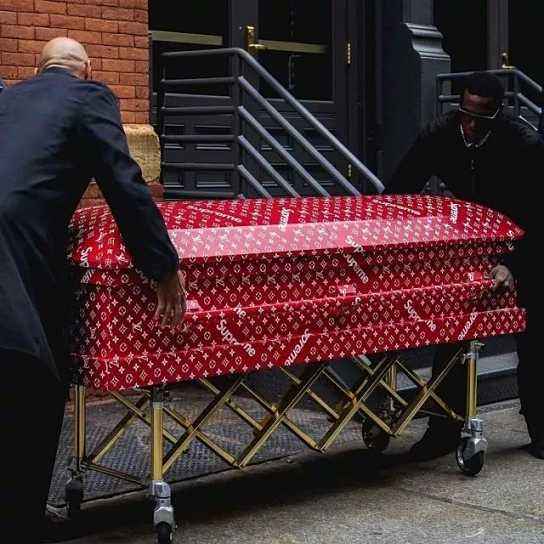But what are the other options? Well, let’s start with cremation.
那我们还有其他选择吗?有的,我们先来说说火化。
Countries all across the world cremate bodies.
世界各地都有火葬的习俗。
In Great Britain, 75% of people get cremated, in Switzerland it’s 85%, and in Japan that number is almost 100%.
英国有75%的人死后都是火葬的,瑞士的比例是85%,日本几乎所有人死后都是火葬的。
Two years ago, for the first time in this country’s history,
两年前,美国有史以来首次出现了
more Americans were cremated than buried and then pretty soon we’re going to hit 50% of Americans being cremated.
火葬的人数比土葬更多的现象,而且,不久之后,我们将有一半的美国人进行火葬。
For one thing, it’s a lot cheaper.
首先,火葬比土葬便宜得多。
A typical cremation costs around $1,400, compared to the $10,000 to $12,000 price tag we mentioned earlier.
一般的火葬只需1400美元左右,而我们前面提到了,土葬的平均耗费在1万美元到1.2万美元之间。
(Again, a little more for that sweet KISS casket.)
(还要说一下,那副KISS棺材的价格更贵。)
Cremating a body also requires much less space, since there doesn’t need to be a grave.
火葬需要的空间也比土葬小得多,因为火葬不需要墓穴。
And it doesn’t require a swimming pool full of formaldehyde either … sorry kids.
也不需要一游泳池的福尔马林……孩子们,对不住了。
You can also do all sorts of fun stuff with your ashes like put them in fireworks,
大家还可以用骨灰做一些好玩的事情,比如把它放到烟花里,
spread them in a National Park, or even turn them into a reef.
撒在国家公园里,甚至让它长成珊瑚。
But is it actually better for the environment?
然而,火葬会比土葬更环保吗?
Cremation does use some resources. So you're heating a body for two hours up to 1800℉(982℃).
火葬也会耗费资源。火葬时需要将遗体加热到982℃。
You‘re using natural gas, electricity. You are releasing pollutants into the atmosphere, most significantly mercury.
所以会用到天然气或者电。还会向大气中排放污染物,主要是水银。
So it sounds like cremation is better, although it’s far from perfect.
总而言之,听起来火葬似乎好过土葬,虽然远非完美的丧葬方式。
Is there no way to do this without hurting the environment?
难道就没有完全不会污染环境的丧葬方式了吗?

Swedish scientists asked that same question and developed something called promession.
瑞典科学家提出了同样的问题,并且提出了一种叫“冰冻藏”的方式。
It’s a process where you freeze a corpse in liquid nitrogen,
这是一种将遗体用液氮冰冻起来,
rapidly vibrate the body so it breaks into millions of tiny particles in just a few minutes,
然后迅速将遗体摇晃成大量细微颗粒,这一过程只需几分钟就可完成,
then freeze dry the particles and remove the harmful metals leftover from your dental fillings.
然后冷冻干燥这些微粒,除去补牙留下的有害金属残留。
You’re left with a fine dust which actually looks very similar to cremated remains.
剩下来的就是一堆看着跟骨灰差不多的细微粉尘。
It solves most of the problems of “modern” burial and cremation,
这种方式能够解决“现代”丧葬和火化的很多问题,
but unfortunately hasn’t been approved for human beings yet.
但不幸的是,这种方式还未通过人体测试。
Another option is alkaline hydrolysis,
还有一种解决方案是碱解,
where a body is put into a chamber which is then filled with water and lye, pressurized, and heated up to about 320 °F.
就是将遗体放入装满了水和碱液的槽中,然后密封加热到160℃。
The body tissue is broken down in a process that’s similar to natural decomposition,
遗体组织就会像自然分解那样分解,
and dissolved to nothing but a skeleton in about 12 hours.
然后在大约12小时的时间里溶化得只剩一句骸骨。
Damn, spooky.
讨厌,怪吓人的。
It’s more environmentally friendly since there’s zero toxic emissions
这种方式更环保,因为不会产生任何有毒物质,
and it has about one-tenth of the carbon footprint as a cremation.
碳足迹也只有火化的十分之一。
All that said, the simplest option might be natural burial.
说了这么多,最简单的丧葬方式或许还是自然埋葬。
A number of natural cemeteries have sprung up across the country where unembalmed bodies are buried in biodegradable containers,
现在,全国各地已经出现了大量自然埋葬的公墓,未经防腐处理的尸体放入可生物降解的棺材内直接下葬,
or sometimes nothing at all, and allowed to decompose naturally.
有时候则是直接将尸体下葬,从而让其进行自然降解。
It’s inexpensive, natural, and can actually help preserve and restore vulnerable land and wildlife.
这种方式既不贵,又自然,还能有助于保护甚至修复我们脆弱的土地和野外环境。
Not to mention it’s how humans have done it for most of recorded history.
何况,自从有文字可考的历史以来,大多数时候人们都是使用的这种丧葬方式。
No matter what the method, though, it’s clear that we have to reform the way that we bury the dead.
无论采用哪种方式,一个显而易见的事实就是我们需要改变我们埋葬故人的方式。
In less than a quarter-century, 76 million people in America alone will get to the average life expectancy of 78 years.
不到25年后,美国平均寿命达到78岁的人群将有7600万人。
If all those people were buried in traditional graves,
如果这些人都葬到传统的墓穴里,
we'd need a cemetery the size of Las Vegas to accommodate their bodies.
我们将需要一个拉斯维加斯大小的墓地来容纳他们的遗体。
The point is, we're all going to die.
问题是,我们每个人都有去世的那天。
The question is, what are we going to do with all the bodies?
这么多的遗体,到时候怎么处理?


